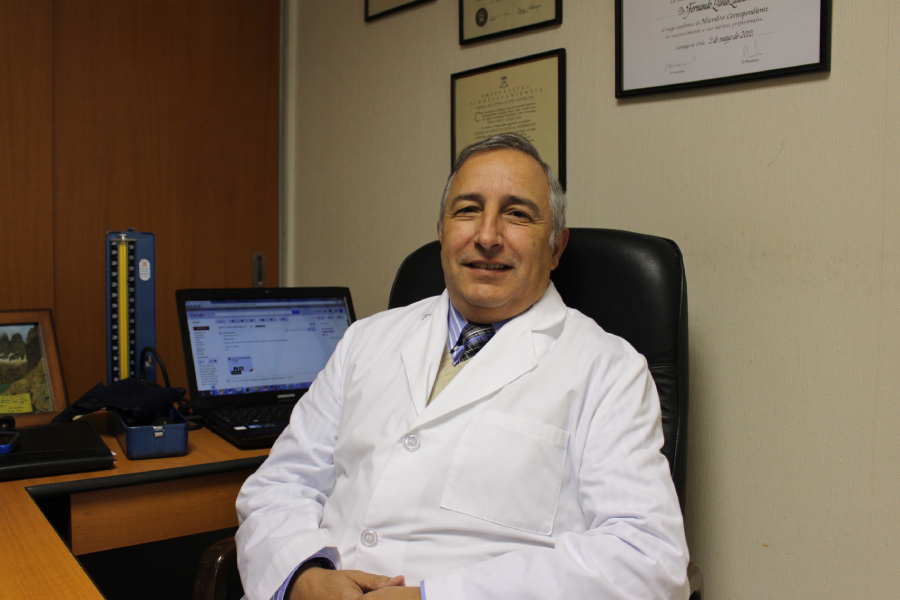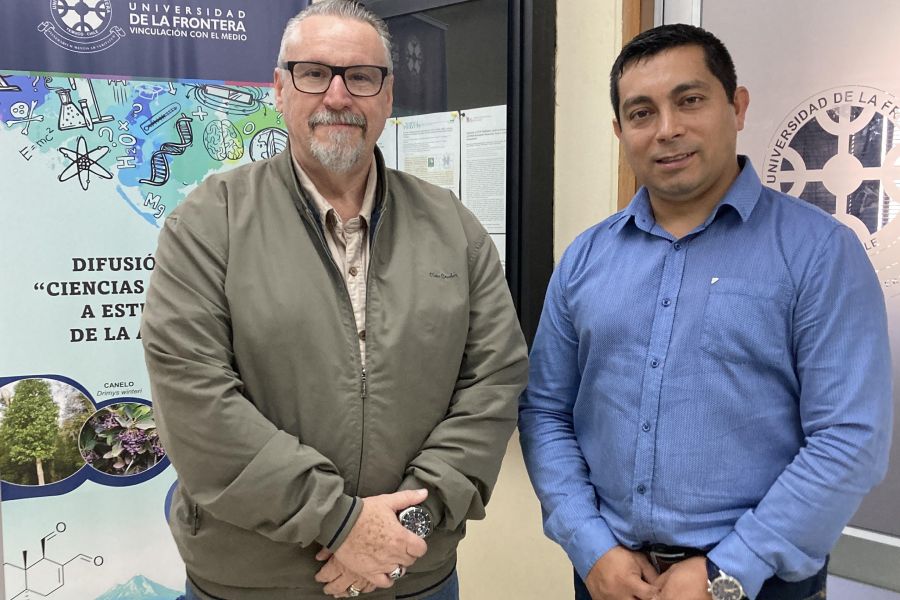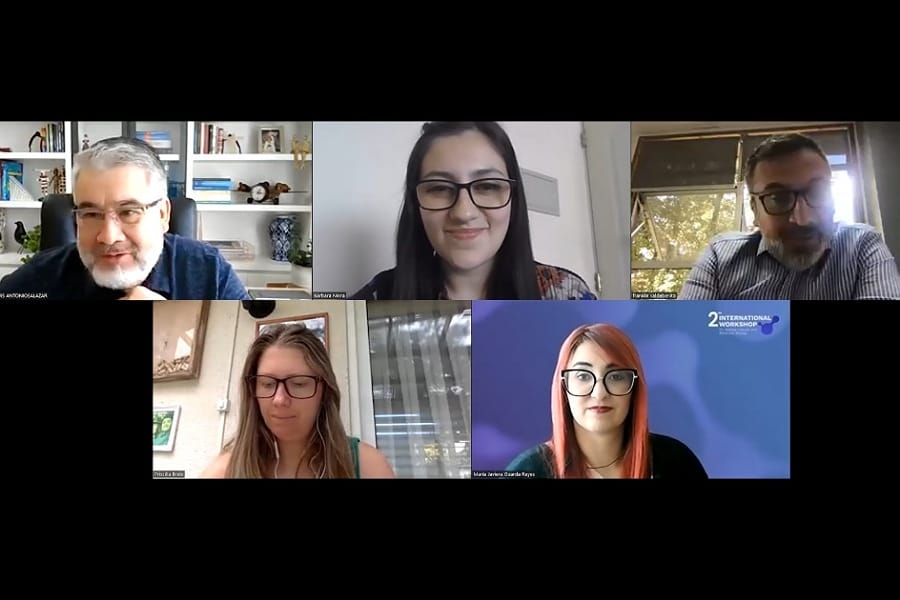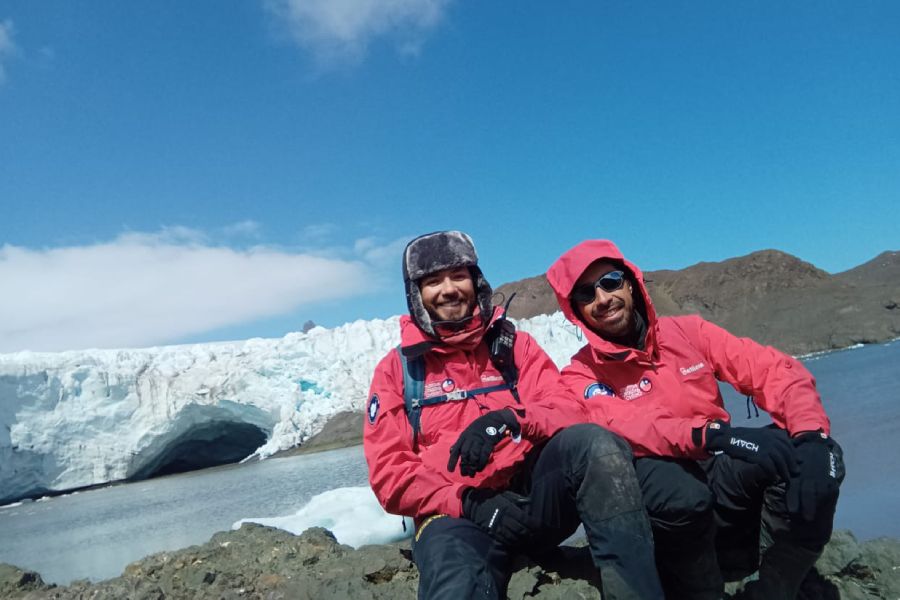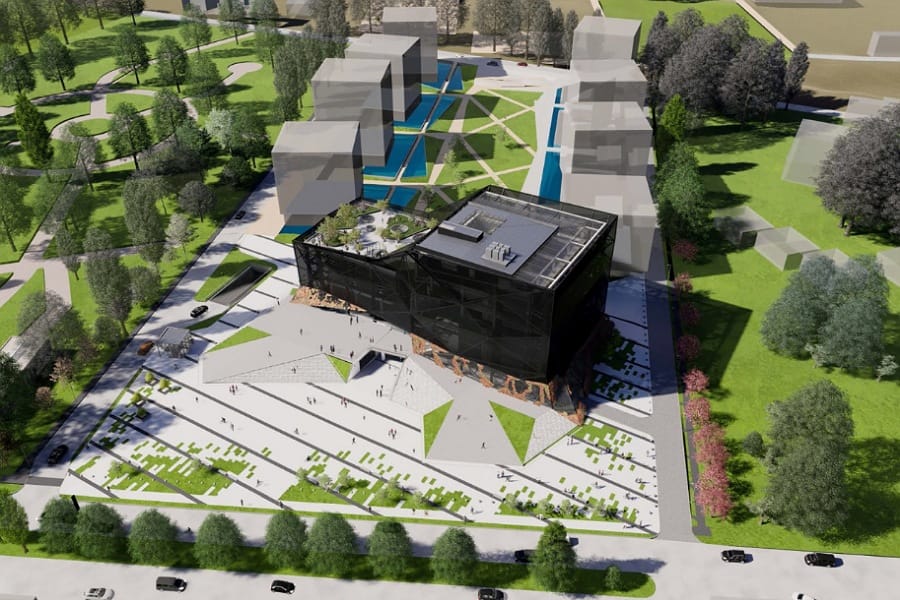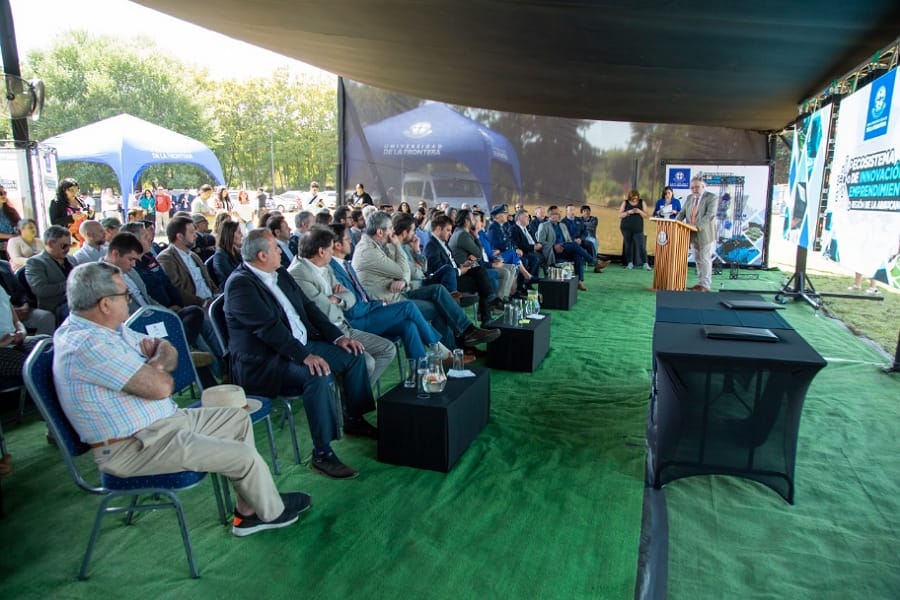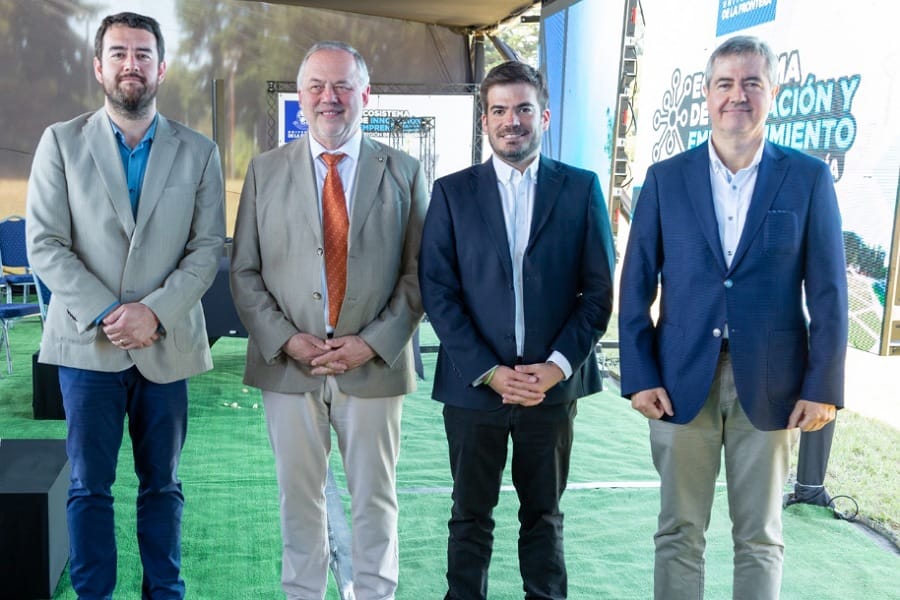|
The academic Dr. Fernando Lanas Zanetti of the Centre of Excellence in Training, Research and Management for Evidence-based Health (CIGES) and the Department of Internal Medicine, is part of the work group that will develop a general framework for the treatment of these two pathologies that are the leading cause of death in Chile and other parts of the world. |
The first meeting of the committee took place in New Orleans, with experts from different parts of the world and Dr. Fernando Lanas Zanetti as a representative of South America. The goal is to work together on a document that provides guidelines and a strategic framework for Ministries of Health all over the world, considering the conditions of the different countries. The academic Dr. Fernando Lanas Zanetti of the CIGES Centre of Excellence and the Department of Internal Medicine of the Faculty of Medicine of Universidad de La Frontera (UFRO), is part of this work group that will develop a general framework for the treatment of these two pathologies that are the leading cause of death in Chile and other parts of the world. In this context, it is worth mentioning that the World Health Organisation had a strong focus on preventive aspects, such as COVID-19 vaccines, the eradication of malaria and other infectious diseases, but also of chronic diseases, cardiovascular diseases and cancer. Other preventive aspects were campaigns against smoking or for the control of blood pressure, cholesterol and obesity, but this approach has changed. “The WHO realised that these measures were insufficient to meet the goal of decreasing the mortality from chronic diseases by 2030. That is why they decided to explore a new area for them, which is the treatment of heart attacks and strokes, which are the leading cause of death in Chile and other parts of the world,” commented Dr. Lanas. Thus, WHO set up a group of experts from different countries around the world to develop treatment strategies for acute coronary syndrome (pre-heart attack and heart attack) and strokes. After the first meeting, global experts and the WHO directors for chronic and cardiovascular diseases focused on the three critical areas of global failure. The first one is related to heart attacks, strokes and the medical capacity to unclog arteries. PREVALENCE OF HEART ATTACKS AND STROKES “The vast majority of heart attacks is caused by a complete or partial blockage of a heart artery, while strokes are mainly caused by a blood clot that blocks or narrows an artery leading to the brain. These blood clots can be destroyed with special intravenous medication or a catheter and a special balloon, but you have to act quickly, because once the artery is clogged, the neurons or heart muscle fibres begin to die and the more time you wait after the first symptoms, the more damage is done. After a certain lapse of time, it is not worth doing anything anymore, because there will only be dead cells left that will scar the person for life, if the person survives,” explained the cardiologist Dr. Lanas. That is why it is important to recognise the symptoms and to know what to do. Therefore, the different governments and their health services need to launch educational campaigns that make people more conscious about the presence of symptoms and that teach them about when to occur to a doctor. “The faster the better,” the cardiologist affirmed. The second aspect is to train the health teams, so they recognise when a heart attack or stroke is on the way. “First, you have to see the physical exam, which is an electrocardiogram that needs to be interpreted by a specialist. In Chile, we have an advanced online transmission system that transmits the data to a 24/7 central control centre in our capital city Santiago de Chile, where a cardiologist prepares an immediate report. If there are signs of a heart attack, the patient must be referred to an establishment where this procedure can be done – in Temuco, it is the public ‘Hospital Dr. Hernán Henríquez’ or the private clinic ‘Clínica Alemana’ – so the referral system has to be fast for patients who live more isolated. Another option is the use of thrombolytic medicine that dissolves the clots. They are available in all of our emergency services,” Dr. Lanas explained. The registry of the PURE project in Temuco shows that, currently, there are more strokes than heart attacks. Out of 100 heart attacks, 75 occur in men; women present fewer heart attacks and at a more advanced age. Strokes occur more evenly in men and women, on average 10 years after a heart attack. “A stroke is more complex than a heart attack, because the crucial exam is a brain scan, which is not available everywhere,” said Dr. Lanas. The third important aspect is to have a clear referral system that includes all health services, which is more complex for arterial procedures and brain scans. “We are advancing with that in Chile, but there are a lot of countries in the world that are not. We have access to thrombolytic drugs or other drugs such as aspirin or those that lower the cholesterol level. The WHO will work with the health ministries around the world to implement these measures and to see if we can reduce cardiovascular mortality by 30% by 2030,” concluded Dr. Lanas. In Chile, we already made a lot of progress regarding the aspects that are part of the strategic framework, although there are still a lot of details missing. The aim of the global strategy led by WHO, in which Dr. Fernando Lanas plays a leading role, is to make further progress, but in all countries in the world. Written by: Fabian Aguirre Silva |
|
CEBIM developed a seminar to present the advances in research about cancer treatment, led by Dr. Paulo Pardi, Dr. Cristian Paz and Dr. Iván González. |
The Centre for Biomedical and Morpho-Functional Sciences (CEBIM) of Universidad de La Frontera (UFRO) had some months of intense work. Apart from several seminars for scientific dissemination, which have already led to promising partnerships and collaborations with peers from national and foreign universities in the field of cancer treatment with ancestral medicinal plants, they are preparing a Master’s Degree Programme in Science with Specialisation in Phytomedicine. In this context, CEBIM held its third seminar on collaboration and dissemination of science, called ‘Interdisciplinary Studies on Cancer Treatment’, where Cristian Paez of Universidad de La Frontera (Chile), Paulo Pardi from University Centre Eniac in São Paulo (Brazil), and Ivan Gonzalez of Universidad de Concepción (Chile) shared the results of their studies carried out in this field of knowledge. The director of CEBIM, Cristian Paz, pointed out: “We held this seminar with the invited speakers in order to present the main achievements we obtained, our high impact publications, as well as studies on bioactive principles in ancestral medicinal plants that are used in Mapuche medicine and have anticancer properties. We have investigated two of them in particular, since they have a marked anticancer activity – we were able to isolate two active molecules that show very strong activity against prostate cancer”. The plants they study with a focus on their positive effects on humans are “Podanthus mitiqui” (Mitique or Palo Negro) and “Drimys Winteri” (Winter’s Bark or Canelo). “Our goal is to obtain natural compounds and to carry out a validation of these products to develop new formulations of natural origin that could be used in different treatments. Therefore, we still need to carry out more scientific and pharmacological studies with regard to these plants,” explained Cristian Paz. “We organised several meetings on cancer treatment in collaboration with professor Pardi and with academics from Brazil, for the validation of Palo Negro-compounds and the progress in animals, to get to the next stage of its application in humans afterwards. In addition, we have active compounds, extracted from a plant, that have a significant effect on parasites, with a very powerful pharmacological effect,” he added. CEBIM CEBIM started a year and a half ago and consists of ten academics, who, in this time, carried out several academic activities and collaborated with other centres, considering the possibility to create a new Master’s Degree Programme in Sciences with Specialisation in Phytomedicine. The first call for this programme is projected for the year 2024. “The dissemination seminars allow us to present and make known CEBIM and the work of the Faculty of Medicine, as well as to find and strengthen our national and international partnerships for collaborations. Those are also visible through the 12 articles we published over the last year and a half, as well as the three seminars we carried out,” concluded Dr. Paz. Written by: Fabian Aguirre Silva, UFRO Faculty of Medicine |
|
The Doctoral Program in Science with specialization in Applied Cellular and Molecular Biology of UFRO organized the online workshop and awarded the best oral presentations and posters. |
The idea for the International Workshop on Applied Cellular and Molecular Biology came up during the COVID-19 pandemic, and its second version, organized by the Doctoral Program in Science with specialization in Applied Cellular and Molecular Biology of the Universidad de La Frontera (UFRO), brought together participants of 22 Chilean and international universities. The workshop consisted of four different symposia, three related to the fields of the doctoral program, and one that showed the students how to introduce the results of their research to the productive sector. Besides the students, also researchers and experts of foundations and national and international research centres, companies for research, innovation and bioentrepreneurship, and public and private health institutions were among the participants. “This important number of national and international participants was possible thanks to one of the good things the pandemic brought us, which is the use of online-platforms. The idea for this event came up in 2021, with the idea of actively maintaining and increasing our national and international partnerships during the pandemic. But also as an important opportunity for our students, graduates and academics to present their lines of research,” explained Dr. Luis Salazar Navarrete, the director of the program. AWARDED PRESENTATIONS During the workshop, the participating experts and students from Argentina, Canada, Columbia, Brazil, Cuba, Costa Rica, France, Mexico, Spain, Panama and Chile had the chance to attend 17 conferences, 14 oral presentations and 28 poster presentations. As part of the workshop, the three best oral presentations and poster presentations were awarded. Among the oral presentations, Daniel López Hernández from Universidad de La Frontera (Chile) reached the first place, Paula Marroquín Morales and Daniela Suárez Bernal from Monterrey Institute of Technology and Higher Education (Mexico) the second place, and Paulina Cabrera Herreros from Universidad de La Frontera (Chile) the third place. Among the poster presentations, Katherine Izquierdo-Fiallo from Universidad de Santiago (Chile) achieved the first place, Consuelo Arias Lattes from Universidad San Sebastián (Chile) the second place, and Roberto Brito Mellado from Universidad de La Frontera (Chile) the third place. Dr. Alejandra Chaparro Padilla, an academic from the Chilean university Universidad de Los Andes was in charge of the inauguration conference of the international event and presented “Oral Precision Medicine. New Perspectives”. The director of the Institute of Innovation and Entrepreneurship of UFRO (iDEAUFRO), Carlos Isaacs Bornand, was in charge of the final conference, where he presented the topic “Managing emerging technologies: New tools to move from lab to market”. Written and translated by: UFRO Communications Office
|
|
The scientist Dr. Alexis Gaete and the biologist Cristian Arenas went to the Ecology Glacier to take permafrost, moraine, and rhizospheric soil samples. |
With the aim of carrying out an expedition to the Antarctic and taking different types of soil samples to evaluate changes in the dynamics of the microorganisms that live there, two researchers of the project ‘Antarctic microbiology of climate change: unearthing unknown virulence and resistance genes’ (mBioClim), led by Universidad de La Frontera (UFRO), travelled to the Ecology Glacier, which is located nearby the Polish base ‘Henryk Arctowski’ on King George Island. “This expedition directly contributes to the different fields of research, which the researchers and experts who are part of mBioClim work in. In addition, it is also a great contribution to the national scientific and technological work,” assures the researcher Alexis Gaete, who is specialised in microorganisms in extreme environments such as the Antarctic Peninsula, as well as his colleague Cristian Arenas, a biologist and support researcher, who also works on the mBioClim project. During their expedition, the researchers collected soil samples of different states of freezing, such as permafrost soil (frozen soil), moraine soil (recently thawed soil due to glacier retreat) and rhizospheric soil (completely thawed soil colonised by plants). In addition, they collected springtail specimens of the species Cryptopygus antarcticus, which is an arthropod endemic to Antarctica that lives in the rhizosphere and is able to tolerate extreme cold conditions. Dr. Gaete pointed out that these species are very interesting, “because they eat the bacteria and fungi that live in the decomposing matter, so in some way they regulate the soil transportation and interactions of soil organisms”. Apart from the study of the diversity of bacteria present in each of the types of soil and the arthropods, for the researchers it is essential to know if there are microorganisms with virulence and antibiotic resistance genes in recently exposed soils due to thaws. Written by: UFRO Vice-rectorate for Research and Graduate Studies |
|
Regional, local and university authorities got together at the Andrés Bello Campus of Universidad de La Frontera to launch this important project. |
The launch of the first Innovation and Entrepreneurship Ecosystem in the La Araucanía Region is a new milestone regarding the development of the region and the construction of its future. The university Universidad de La Frontera (UFRO) initiated this initiative with support of the regional government and the Production Development Corporation (CORFO). The idea is to create a space where different local, national and international actors, both public and private, can get together for the co-creation and systematic development of solutions and scientific and technological entrepreneurships with potential for global scaling. Regional, local and university authorities, as well as representatives of technology companies, public development agencies, R&D&I centres, centres, start-ups and business accelerators, gathered at the Andres Bello Campus of UFRO to launch this important project that aims at developing a knowledge-based economy to promote innovative solutions from the Araucanía Region for Chile and the world. The launch took place at the future location of the main building of the ecosystem, a modern and sustainable infrastructure with technological components, with open workspaces and spaces for the promotion of innovation and entrepreneurship. This will be the first of several structures that will be added to the ecosystem in the long term. “This new project is an important qualitative milestone, with which we will bring the private and public sector, the regional government, the municipalities, the neighbourhood councils, etc. together. Our idea is to bring together all the productive sectors in order to promote and add value to our region, which really needs this. This initiative is a competitive alternative for developing and retaining local talents with knowledge of the territory, as well as for attracting foreign creative talents, who coordinate and connect with all the stakeholders in charge of the productive development,” explained Dr. Eduardo Hebel Weiss, the rector of UFRO. “This will be the first technology park in the La Araucanía Region. This is going to be a space as we have seen it in different parts of the world. It will solve different issues from the point of view of knowledge generation, technological development, and how we add value to the different products of our region, in order to have a balanced productive development that allows the La Araucanía Region to progress,” said Luciano Rivas Stepke, the governor of the La Araucanía Region. “The Rector spoke to us some time ago in order to be part of this venture and to create all kinds of agreements, which will allow us to support this ecosystem with all of our regional ministries. This great project, which can turn our region into a pioneer regarding technology and innovation, does not only need certain infrastructures, but also certain skills and human capital,” commented the regional presidential delegate, José Montalva Feuerhake. On this event, Eduardo Hebel Weiss, the rector of Universidad de La Frontera, signed several strategic cooperation agreements with Luciano Rivas Stepke, the governor of the La Araucanía Region; with the Production Development Corporation (CORFO), through its strategic affairs manager, Claudio Maggi; and with José Montalva, the regional presidential delegate. These alliances are a support and give relevance to the proposal of a regional ecosystem, and allow to work and progress together in this initiative.
Once the ecosystem starts working, its main purpose is to attract, retain and provide creative human talent; to facilitate relevant resources, both in terms of infrastructure and services that promote productive and economic co-development of high value; to promote a permanent knowledge flow within the community of the ecosystem; to increase the interaction between companies, institutions and individuals; and to strengthen the cooperation and synergies for the development of competitive businesses. Which structure does this ecosystem have? The project considers the cooperative work in a network of different nodes in different physical spaces throughout the region and is designed for the coexistence and systematic cooperation between companies, technology start-ups, universities and public agencies for production development, with the aim of progressing in the development of innovative solutions and promoting science and technology-based ventures with the potential for global scaling. Although the official launch of this initiative took place in January 2023, the development started much earlier, with the installation of the first Node of the Ecosystem, located in one of the University’s buildings in Prat 332, in the city centre of Temuco. Several technology companies, entrepreneurs, public development agencies and technology centres linked to this initiative already work there, giving shape to this promising venture. Currently, the University installed a University Committee for this project that focuses on a participatory process to analyse, propose and define a management model for the Ecosystem. An international consultant expert in the design and development of such global initiatives accompanies the process to guarantee and to learn at first hand about the best practices, required partnerships and related outreach models that must be considered in the implementation and consolidation of transformational initiatives such as this one. Escrito por: UFRO Communications Office
|





